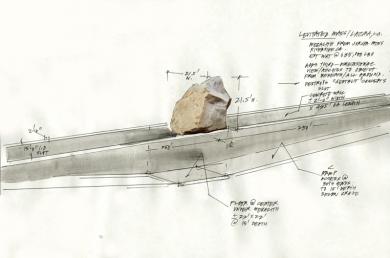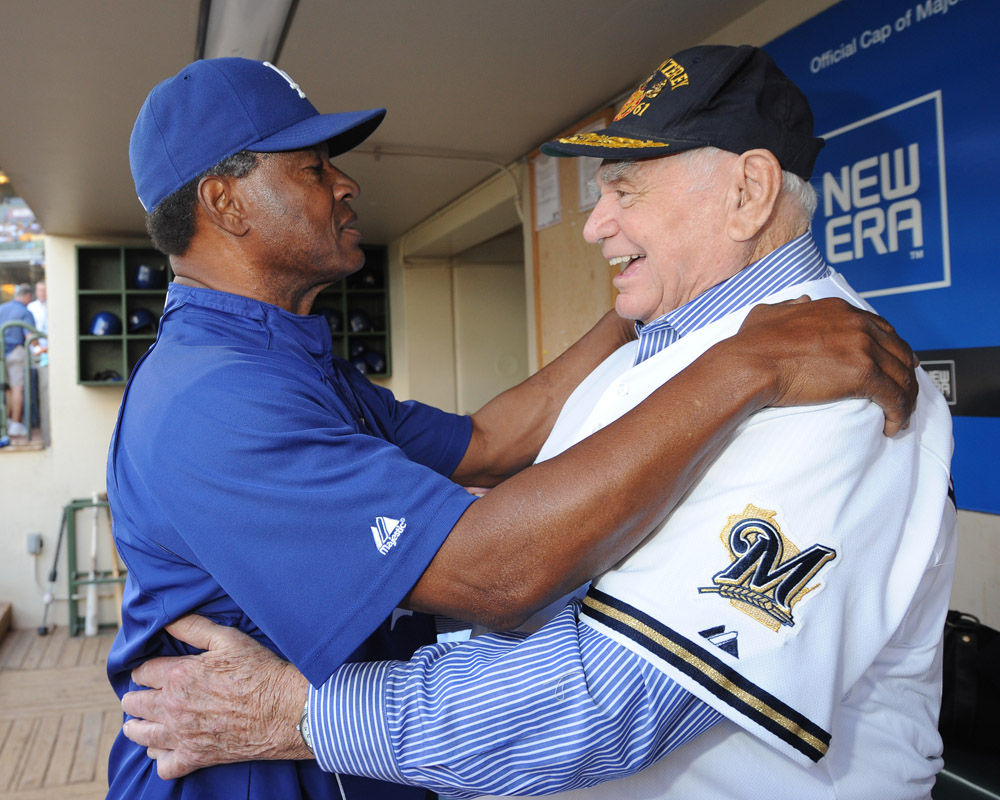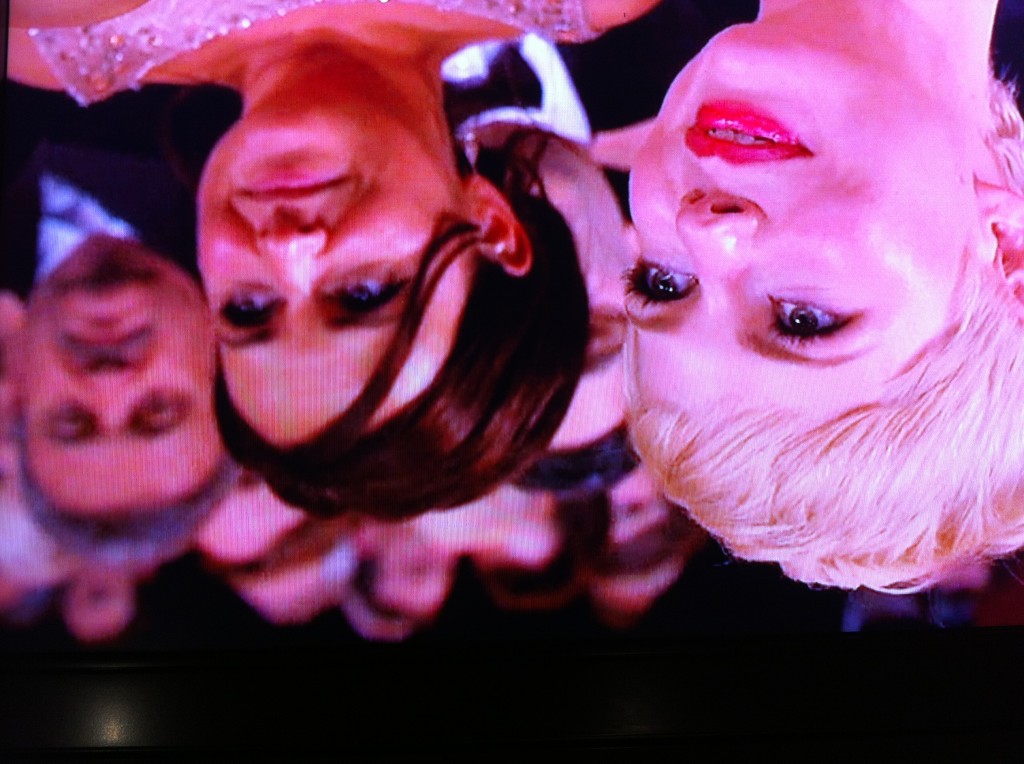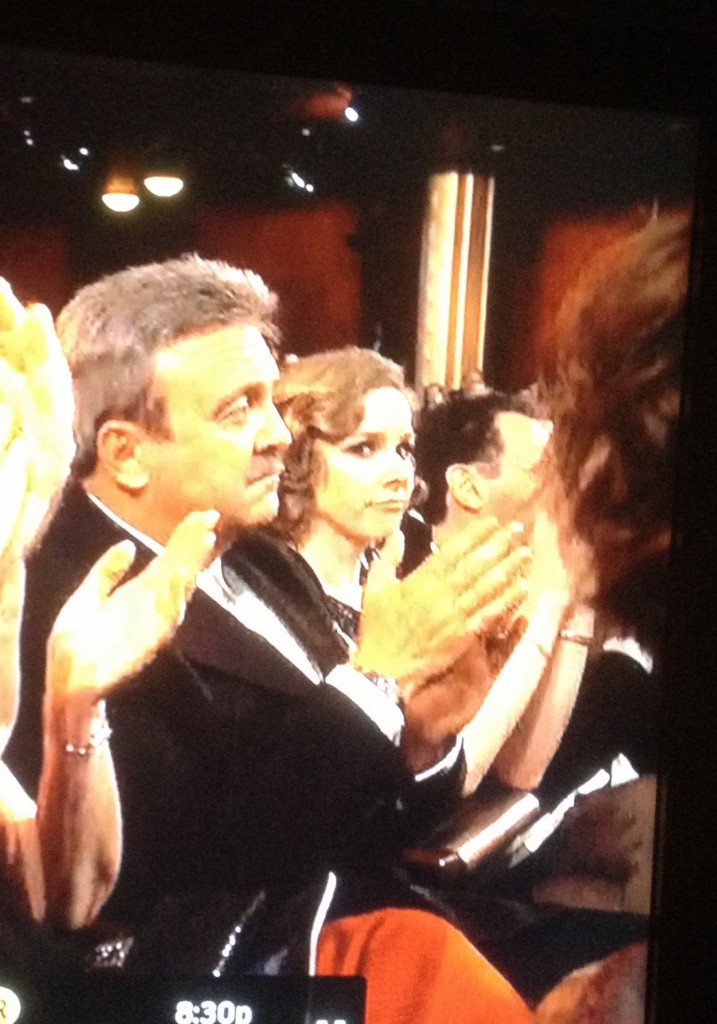This 2009 photo is from a collection by Jon SooHoo of the Dodgers.
Category: Entertainment (Page 4 of 5)
The real deal …
Debate over HBO’s The Newsroom which premieres Sunday, has unfortunately splintered in some pockets online into a referendum on the show’s creator Aaron Sorkin — as if you must have problems with Sorkin himself if you have problems with the show.
My audience relationship with Sorkin dates back to seeing A Few Good Men performed on stage with Michael O’Keefe in Los Angeles two decades ago, a memorable night. I was a diehard fan of Sports Night and an admirer of The West Wing, The Social Network and Moneyball. On the other hand, Studio 60 on the Sunset Strip was a mess, highlighted by its completely unconvincing portrayal of what it kept assuring us was the greatest latenight show in the history of man. (The genius of the other latenight-themed program that premiered at the same time, 30 Rock, was that it took the opposite tack of making its show-within-a-show an embarrassing near-failure.) But you can’t win ’em all — I certainly didn’t lose respect for Sorkin because he couldn’t pull this one off.
In the first episode of The Newsroom, there are two traits that stick out. One is that there is dialogue, even by Sorkin standards, that is just preposterous. I’m not talking about the style of speech — I’m talking about the substance. Just as an example, right in the main opening scene, Jeff Daniels’ anchorman character, Will McAvoy paints a picture of America that would seem to deny that Sorkin ever heard of Joe McCarthy. Turns out, there’s a McCarthy reference later in the episode, so there goes that theory. Straw men are not in short supply on this show.
Secondly, while the characters in Sorkin’s best work, however confident or even arrogant they might be, feel truly human, McAvoy just feels plain arrogant. Unlike some of my work colleagues, I’ve only seen the premiere, so I can’t speak to what future episodes hold. But the first episode makes McAvoy into someone whom we’re supposed to root for despite his personality flaws. That would be all well and good if he truly seemed heroic, but since the deck is stacked so heavily in his favor (and I say this as someone sympathetic to the cause), it doesn’t feel like real heroism.
All that being said, I didn’t think the premiere of The Newsroom was bad. It moves quickly despite its 75-minute length, and its aims are certainly honorable. But I thought it was flawed, and not only that, the nature of the flaws made me pretty nervous about future episodes. That’s not a referendum on Sorkin, just on the show.
* * *
You might say that Louie, in contrast to The Newsroom, is a show that works even when it’s not working. The parts that meander have their own particular fascination because of how honest they feel. The rest of the show, which premieres its third season Thursday, will blow you away.
In particular, the second episode of the upcoming season, featuring guest star Melissa Leo, will be one of the most memorable half-hours of the year — amazing to the level of last year’s “Palestinian Chicken” episode of Curb Your Enthusiasm. The funny thing is that my favorite part of the episode isn’t the provocative second half, but rather a joke by his daughter that Louis CK shares early on. Nevertheless, I can’t wait for people to see the whole thing.
Episodes four and five form a two-parter that is also spellbinding. The mind of Louis CK simply astounds me. The guy is flat-out funny, but he’s also, in my book, one of the deepest thinkers around.
* * *
Finally, for those of you with DirecTV, keep an eye out for Hit & Miss, which will premiere on DirecTV’s audience network July 11. The premise is ordinary enough: Chloe Sevigny plays a transgender hit person. But rather than sensationalize it, the drama does the opposite — it’s brooding, and although slowly paced, engrossing. (The teaser above jazzes things up a bit and doesn’t quite convey the show’s mood.)
The first episode has the feel of a good U.K. independent film, only rather than wrapping up the story tidily, it’s just getting started.
The Dodgers lead the majors this year in Ultimate Zone Rating, according to Fangraphs (via Baseball Musings), by a significant margin. Tony Gwynn Jr., Mark Ellis and James Loney lead the contributions.
* * *
At my Variety blog The Vote, I have a post about Sunday’s episode of “Mad Men” that, if you’ve seen the episode, you might find worth your time.
I mean, are you kidding me? Holding your own with “Between Two Ferns?” I’m in heaven.
(First seen on Sons of Steve Garvey.)
Over at Variety’s On the Air blog, I’ve been offering sneak peeks at the 2012-13 TV shows being announced this week by the broadcast networks. NBC, Fox and ABC have already been covered, with a set of CBS clips coming later today and the CW Thursday.
It’s too early to make any informed judgments about the shows, but this will give you a taste.
Oh, this would probably be a good time to introduce a different blog I’m shepherding at Variety: The Vote. Its focus is the Oscars, Emmys and other entertainment industry awards. It’s part of a shift in my duties at Variety that has given me more emphasis in this area. Because I was already heavily focused in TV, the main change will be that I’ll be more involved in our Oscar and other film awards coverage than before.
For Variety, I’ve written a couple of blog posts that I think are kind of fun: celebrating TV’s top series that only received one season on the air. The first post deals with the 2000s, the second with the 1990s. If I missed a show you liked, it might be because I didn’t see it, didn’t like it or that it actually ran for more than one season – but let me know what you think.
You’d be amazed how often I still hear that “Tiny Mighty Mos” song in my head. And I must have seen that “Stay Alive” commercial a thousand times. The line deliveries are worthy of Olivier.
Don’t even get me started on “Life” or “Connect Four.”
 While the import to Los Angeles of free agents such as Aaron Harang and Chris Capuano generated split opinions over their value, they were not alone, or even the most noteworthy in the county.
While the import to Los Angeles of free agents such as Aaron Harang and Chris Capuano generated split opinions over their value, they were not alone, or even the most noteworthy in the county.
Within 24 hours, the primary part of Michael Heizer’s Levitated Mass, a 21-foot, 340-ton boulder (yes, bigger than Jonathan Broxton and Todd Coffey combined) that has been slowly working its way across Southern California, will arrive at its new home, the Los Angeles County Museum of Art, where it will hover above a 456-foot-long, 15-feet deep slot. (Information concerning its arrival can be found here; you can also follow on Twitter.) Levitated has interested me for several reasons: my ties to LACMA from having worked there from 2002-2006, my view of the museum and its landing-strip outdoor home for Leviated from the window of my current Variety office, and above all, the polarized reaction Levitated has generated.
In its initial stages, any appreciation for what Levitated might mean was drowned out by amazed if not angry cries: “LACMA is spending $10 million for a rock?” Indeed, the cost for bringing Levitated to LACMA did require eight digits worth of private fundraising, to account for the unique challenge of the oversize delivery that required removing and reinstalling traffic lights, wires and other obstacles. Surely that money could be better spent on something else.
 There are two threads to that argument. The first is whether any arts spending is superfluous when your city faces hard times. From my experience at LACMA, all I can tell you is that study after study exists to show that arts spending has payoffs for the community that more than justify itself. (Not to be ignored is the question of whether funds diverted from the arts would go to an area that had even less value to society.) In addition, LACMA notes that Levitated offers Los Angeles both a near- and long-term economic benefit.
There are two threads to that argument. The first is whether any arts spending is superfluous when your city faces hard times. From my experience at LACMA, all I can tell you is that study after study exists to show that arts spending has payoffs for the community that more than justify itself. (Not to be ignored is the question of whether funds diverted from the arts would go to an area that had even less value to society.) In addition, LACMA notes that Levitated offers Los Angeles both a near- and long-term economic benefit.
The second thread is, even if you support arts spending, whether Levitated qualifies as the right kind of arts spending. This is inherently subjective. Again, much initial reaction across the public seemed highly skeptical. However, the rapid groundswell of interest — as celebratory as an Olympic torch run — in Levitated indicates, at a minimum, that there’s a high curiosity factor. And something tells me that once it is in place at LACMA, it is going to be the kind of experience that more than fulfills its goals: to amaze and inspire.
Rare is the piece of art, no matter how much its financial worth, that is meaningful to everyone. Everyone has seen a so-called masterpiece that leaves them cold. So it’s unreasonable to expect everyone to appreciate Levitated Mass, but despite the initial concern, this might be a free-agent gamble that pays off.
If so, this would be akin to a scouting department triumph for LACMA, though you can decide how Moneyball-like it is. Levitated might not have had the look of a top prospect or marquee free agent, but here we are, poised for its potential earthquake of a debut.
No album from my all-time favorite rock ‘n’ roll performer is ever anything close to a failure, but Bruce Springsteen’s most recent release of new material before this year, 2009’s Working on a Dream, was as sloppy as he’s ever had. Two of the songs, “Outlaw Pete” and “Queen of the Supermarket,” forever come across as virtual Springsteen parodies, each telling a story that resembled a vintage Springsteen tale except for the way they were stretched into utter preposterousness. The rest of the album was a mixed bag – certainly adequate, especially considering the high standards Springsteen has set for himself, and with a couple true gems such as the Danny Frederici tribute “The Last Carnival” – but overall as a collection of songs, it was a work in search of coherence, lyrically and musically.
Between then and now, Springsteen put out the double-sided The Promise, a compilation of numerous songs composed following Born to Run but either left off Darkness on the Edge of Town and other subsequent albums, or significantly reworked. The Promise simultaneously illustrated the ability of Springsteen at the top of his game and the extent of his wide-ranging interests, again both in music and subject matter. As if we didn’t know already, there’s a reason Springsteen has kept putting out material into his 60s: he’s a well that won’t dry up.
His brand-new album, Wrecking Ball, isn’t as satisfying or enlightening as The Promise, but it does represent the beginning of a journey back from the erratic qualities of Dream. The Boss is still a bit too infatuated with stylistic variety for his own good – some will certainly argue that it keeps things fresh, but it starts to take on a everything-but-the-kitchen-sink approach that becomes a distraction.
Parts of Wrecking Ball are simply overproduced. More than once when a stray gospel chant, Irish accent, rap solo or other element comes into earshot, I found myself saying, “Just play the song.” From a younger artist it might come across as insecurity, but from a Hall of Famer like Springsteen it feels more like the indulgence of someone who is just having too much fun – even in the angry songs – to help himself.
But this much can be said: Never on Wrecking Ball does Springsteen go so far as to venture into the kind of implosions that “Outlaw Pete” and “Queen of the Supermarket” represent, and often, especially after repeat listening, the pieces of flair win you over.
And when things work, they really do work. “Land of Hope and Dreams,” which has been a Springsteen tour staple for some time now, is just rousing – if you haven’t heard the live version, you’ll certainly get a taste of what it must be like. (It also includes what would seem to be the final notes played by Clarence Clemons on a Springsteen album, and your heart will break each time you hear them.)
And the pitch-perfect “Wrecking Ball,” one that he began playing on tour a couple years back (with little hint at least at the outset that it would become his next album’s title track), proves to be the best of them all.
In some ways, it’s a rough and tough sequel to the now 27-year-old “Glory Days.” Its main character is Giants Stadium, just before being demolished, and it opens …
I was raised out of steel here in the swamps of Jersey
Some misty years ago
Through the mud and the beer, and the blood and the cheers
I’ve seen champions come and goSo if you got the guts mister
Yeah, if you’ve got the balls
If you think it’s your time
Then step to the line
And bring on your wrecking ballBring on your wrecking ball
Bring on your wrecking ball
Come on and take your best shot
Let me see what you’ve got
Bring on your wrecking ball …
The lyrics don’t need my explanation. It’s a song that stares straight into the face of mortality. “Wrecking Ball” reminds us that everyone has their battles, and we fight them, fight them to win, even if we know, in the end, we all lose the war.
… Now when all this steel and these stories
They drift away to rust
And all our youth and beauty
It’s been given to the dustAnd your game has been decided
And you’re burning the down the clock
And all our little victories and glories
Have turned into parking lotsWhen your best hopes and desires
Are scattered to the wind
And hard times come
And hard times go
And hard times come
And hard times go
And hard times come
And hard times go
And hard times come
And hard times go
And hard times come
And hard times go
Just to come again!
Bring on your wrecking ball …
The song then brings the entire E Street Band in a singing primal call to the wild, one that couldn’t sound more right. It’s moments like these that Springsteen delivers like no one else.
Nope, your eyes didn’t deceive you. That was Dodger general manager Ned Colletti at tonight’s Oscars.
I asked Colletti via text message what brought him to the Oscars.
“Once in a lifetime,” he replied. “Tom Sherak (president of the Academy) is a good friend of mine, and I came as his guest.”
As far as the results, I had few complaints. The Artist was my favorite of the nominated films, and Christopher Plummer’s supporting actor victory filled as best as possible my desire for Ewan MacGregor and Beginners to be recognized. I was a bit surprised that Meryl Streep edged Viola Davis in lead actress, but perhaps voters felt Streep’s 2-14 record in Oscar noms entering the evening was getting a little too Anthony Young-like.
The show itself was predictably ragged, incorporating numerous elements that almost seemed designed to turn off both film and television audiences, but the “In Memoriam” approach was the best in recent memory, and the Best Picture montage incorporated one of my favorite soundtrack elements of the year, from Moneyball.
My favorite part of the evening, though, was my 9-year-old’s sudden interest in watching the show and seeing her reactions as she took all this in – for better or worse – for the first time. Of the nominated movies, she had only seen Hugo – but that meant she still got to be excited about multiple awards. And she was happy, as was I, that “Man or Muppet” won for best song (out of the ridiculously low two nominees).
If anyone around wants to talk Oscars today and tonight, let this be the place. The ceremony’s official start time on ABC is 5:30 p.m. You can also follow all my colleagues at Variety here.
From January: My favorite films of 2011.
Does the World Wide Web get any better than this? Howard Cosell analyzes Jan Smithers while she sits in a dunk tank at the mercy of Dick Van Patten in 1979 on Battle of the Network Stars.
“This is a very serious girl, in point of fact,” Cosell concludes.









